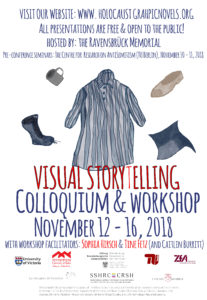Our project grew out of a 2018 Social Sciences and Humanities Research Council Connections Grant. The Visual Storytelling Colloquium & Workshop at Ravensbrück brought together scholars, artists, librarians, and students from around the world and consisted of a series of graphic novel & teaching workshops (schedule below). The full program can be found here: Visual Storytelling Colloquium and Workshop Program 2018 (PDF)
Title: Visual Storytelling Colloquium & Workshop at Ravensbrück Memorial
The Ravensbrück Visual Storytelling Colloquium and Workshop took place from November 12 – November 16, 2018. It brought together an international team of Holocaust scholars, graduate students, Holocaust practitioners and visual artists from Canada, Germany, and Israel.
The goals of the Visual Storytelling Colloquium and Workshop at Ravensbrück Memorial were to foster innovative interdisciplinary and intercultural discussions on Holocaust learning and teaching while encouraging a diversity of perspectives. Our aim was to approach Holocaust education from multiple disciplinary and community-engaged angles and embed it within a comparative human-rights based framework.
Graphic Novel Workshop
November 14th
When: 14:00 – 15: 30
Presentations and follow-up discussions
Facillitators: Tine Fetz, Sophia Hirsh, and Caitlin Burritt
Where: Workshop Room 2, Educational Department
November 14th
When: 17:00 – 20:30 (with dinner break)
Guided by the facilitators, participants create art concerning Holocaust memory and the Ravensbruck Memorial site
Facilitators: Tine Fetz, Sophia Hirsch and Caitlin Burritt
Where: Workshop Room 2, Educational Department
November 15th
When: 17:00 – 18:00
Guided by the facilitators, participants create art concerning Holocaust memory and the Ravensbruck Memorial site
Facilitators: Tine Fetz, Sophia Hirsch and Caitlin Burritt
Where: Workshop Room 2, Educational Department
November 15th
When: 19:10 – 20:30
Participants will finish their art and engage in a student-led debriefing. The focus of this debriefing will be: Visuals of the Day
Facillitators: Tine Fetz, Sophia Hirsh, and Caitlin Burritt
Where: Workshop Room 2, Educational Department
View Full Program
Visual Storytelling Colloquium and Workshop Program 2018 (PDF)
Poster & Front Page illustration: Caitlin Burritt
Graphic Novel Workshop illustration: Sophia Hirsch
About the Ravensbrück Memorial
Visit the Ravensbrück Memorial Website:
Where is the Ravensbrück Memorial?
16798, Str. der Nationen, 16798 Fürstenberg/Havel, Germany
How do I get there?
By train: Take the regional train ( RE) 5 in the direction Berlin to Stralsund/ Rostock, get off the train at the Fürstenberg/Havel stop. This train runs every hour. The Memorial is a 25-minute walk from Fürstenberg station, where taxis are also available.
By car: Fürstenberg is located 80 kilometres north of Berlin on Bundesstrasse (Federal Highway) 96, which runs from Berlin to Stralsund; the way to the Memorial from Fürstenberg is signposted.
Funding
Thank you to our funding partners!
![]()
We also gratefully acknowledge the support of the following faculties, units, and interdisciplinary research centres at the University of Victoria: the Faculty of Humanities, Department of Germanic and Slavic Studies, Electronic Textual Cultures Laboratory, UVic Libraries, Centre for Studies in Religion and Society, Centre for Global Studies, and UVic Technology Integrated Learning.
About Us
We are:
We believe that visual storytelling contributes significantly to Holocaust Education.
We are committed to fostering innovative interdisciplinary and intercultural discussions on Holocaust learning and teaching while encouraging a diversity of perspectives.
Artists and Project Leaders
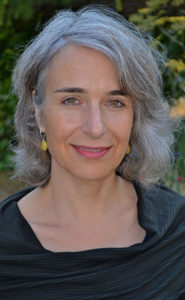 Charlotte Schallié is an Associate Professor of Germanic Studies at the University of Victoria, Canada. Her research interests include Holocaust education, post-1945 German literature and film, transcultural studies, and Jewish identity in contemporary cultural discourse. Together with Agnes Hirschi, she is the co-editor of Under Swiss Protection: Jewish Eyewitness Accounts from Wartime Budapest (Stuttgart: Ibidem Press, 2017).
Charlotte Schallié is an Associate Professor of Germanic Studies at the University of Victoria, Canada. Her research interests include Holocaust education, post-1945 German literature and film, transcultural studies, and Jewish identity in contemporary cultural discourse. Together with Agnes Hirschi, she is the co-editor of Under Swiss Protection: Jewish Eyewitness Accounts from Wartime Budapest (Stuttgart: Ibidem Press, 2017).
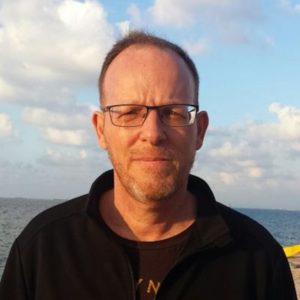 Arie Kizel is the head of the Development of Educational Systems Program at the department of Learning, Instruction and Teacher Education, in the Faculty of Education at the University of Haifa. He has been the president of ICPIC (The International Council for Philosophical Inquiry with Children) since 2017. Arie’s research areas are: philosophy of education, philosophy with (and for) children, research of curriculum and textbooks and study of social groups’ narrative. He was the head of the Israeli-German commission for textbooks research from 2010 – 2015.
Arie Kizel is the head of the Development of Educational Systems Program at the department of Learning, Instruction and Teacher Education, in the Faculty of Education at the University of Haifa. He has been the president of ICPIC (The International Council for Philosophical Inquiry with Children) since 2017. Arie’s research areas are: philosophy of education, philosophy with (and for) children, research of curriculum and textbooks and study of social groups’ narrative. He was the head of the Israeli-German commission for textbooks research from 2010 – 2015.
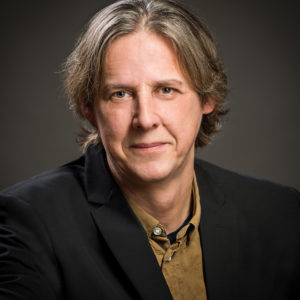 Marcus Funck is a historian, research associate and the graduate program director at the Zentrum für Antisemitismusforschung der Technischen Universität Berlin. He studied in Freiburg, St. Catharines, and in Berlin where he received his MA as well as his PhD. Marcus was the DAAD Visiting Professor at York University from 2006 – 2010 and he joined the Zentrum für Antisemitismusforschung in 2011. His current research is on the “New Right” in Germany and on German discourses on multiculturalism in historical perspective dating back to the 18th century.
Marcus Funck is a historian, research associate and the graduate program director at the Zentrum für Antisemitismusforschung der Technischen Universität Berlin. He studied in Freiburg, St. Catharines, and in Berlin where he received his MA as well as his PhD. Marcus was the DAAD Visiting Professor at York University from 2006 – 2010 and he joined the Zentrum für Antisemitismusforschung in 2011. His current research is on the “New Right” in Germany and on German discourses on multiculturalism in historical perspective dating back to the 18th century.
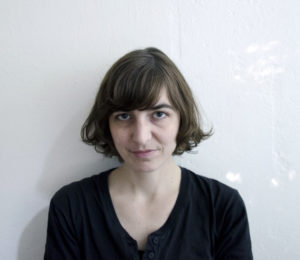 Tine Fetz is working as an illustrator and comic artist in Berlin after studying Illustration in Münster and Jerusalem. Besides commissional work for magazines and other publications she is creating her own graphic novels and comic strips
Tine Fetz is working as an illustrator and comic artist in Berlin after studying Illustration in Münster and Jerusalem. Besides commissional work for magazines and other publications she is creating her own graphic novels and comic strips
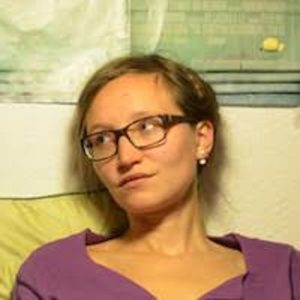 Sophia-Louise Hirsch studied Fine Arts, Communication Design and Illustration in Berlin, Jerusalem and Halle. She works at the museum and memorial Sachsenhausen. She is a freelance artist and illustrator who has developed several art projects that deal with diverse historic or sociopolitical topics and operate with different media.
Sophia-Louise Hirsch studied Fine Arts, Communication Design and Illustration in Berlin, Jerusalem and Halle. She works at the museum and memorial Sachsenhausen. She is a freelance artist and illustrator who has developed several art projects that deal with diverse historic or sociopolitical topics and operate with different media.
Speakers
We offer a range of academic speakers from a variety of fields and backgrounds
Maja Sturm is a senior teacher (German language, literature, art), and school book author. She moderates advanced teacher training and supports gifted and talented students at her school with a special focus on intercultural aspects. Since 1998 she has worked as a lecturer at the University of Paderborn, organized a German-Israeli-student exchange, excursions to Poland and has also contributed to the “Hands across the Campus” project. She was a Fulbright scholarship holder in 2014 (“Diversity in US Education”). Maja Sturm currently gives lectures on Holocaust Learning, Human Rights Education and aesthetic approaches at the University of Osnabrück.
Christoph Sturm is a research assistant and lecturer at the Institute for Educational Science at the University of Osnabrück. He previously worked at the University of Münster and the University of Paderborn. He has conducted seminars on the issue of “Holocaust Learning” for almost twenty years, and has also contributed to “Hands Across the Campus” project. Christoph teaches and researches West Germany’s policy for dealing with the past with a special focus on the “68 Generation Student Movement.”
J. Matthew Huculak is Digital Scholarship Librarian at the University of Victoria in British Columbia, Canada. He is the director of the Modernist Versions Project and cofounder of Open Modernisms. With degrees in both library science and literature he publishes and teaches on the intersections of archives, libraries, book history, modernism, and periodical studies. He is the former Managing Editor of the open Modernism/modernity Print Plus platform at the Johns Hopkins University Press Journals Division; Project Manager for the Modernist Journals Project; and editorial assistant at the James Joyce Quarterly. Every June, he co-teaches the Pre-Digital Book course at the Digital Humanities Summer Institute.
Adam Scime is a young composer, performer, and academic living in Toronto. He has been praised as “a fantastic success” (CBC) and “Astounding, the musical result was remarkable” (icareifyoulisten.com). Adam’s music is widely known for its coloristic exploration and innovative sonic experimentation. His work has received many awards including the 2015 CMC Toronto Emerging Composer Award, The Socan Young Composer Competition, The Karen Keiser Prize in Canadian Music, The Esprit Young Composer Competition, and first prize in the 2018 Land’s End Composer Competition. Adam recently completed his doctorate at the University of Toronto.
Diana Schuemann is from Berlin. She recently graduated in Holocaust Studies at Haifa University. Diana previously earned a graduate degree in Education, Psychology and Cultural Studies at Philipps University Marburg. Diana is also a dance theater artist with a focus on urban dance and urban arts. She curated exhibitions in Israel and Hungary (Jewish Museum Budapest) and taught dance projects in connection with Holocaust Education in Israeli High Schools.
Kaitlin Findlay is Research Coordinator for Landscapes of Injustice, a 7-year multi-sector and community-engaged project to research and tell the history of the forced sale of Japanese-Canadian-owned property during the 1940s. She completed her BA in History (Honors) at McGill, she defended her MA Thesis at the University of Victoria in 2017. Her MA thesis examined how the federal government used a Royal Commission to submerge Japanese Canadians’ claims for property loss and promulgate a public narrative of state accountability. In 2017, Kaitlin completed a Co-op term at the Nikkei National Museum, acting as assistant curator for the exhibit Hastings Park, 1942. Since then, she has served as a research consultant on two public historical projects: virtual exhibit “Writing Wrongs” and the augmented reality game “East of the Rockies”.
Caitlin Burritt is a second year MA student in the Holocaust Studies graduate program at the University of Victoria. After completing her BA in Germanic Studies at the University of Victoria, she moved to Dresden, Germany in 2015. Living and teaching in Dresden inspired her Master’s project, a graphic novel focusing on the relationship between Holocaust memory in Dresden and the city’s response to the Refuge Crisis of 2015. Over the summer she completed the I-witness Holocaust Field School program, as well as a research practicum at the Ravensbrück Memorial where she studied artwork made by the prisoners of the Ravensbrück concentration camp.
Students
The Visual Storytelling Colloquium and Workshop aims to facillitate dialogue and exchange of ideas between students from Canada, Germany and Israel.
Chen Miller lives in Tel- Aviv with her life partner. For the last 5 years she has worked in a special education school. She develops educational approaches and lectures in Israel and other countries. She has BA in Education and Theater and is currently doing her Master’s in Alternative Education at the Faculty of Education at the University of Haifa.
Dikla Lerner Dominitze lives in a Kibotz in the northern part of Israel, along with her life partner and their two children. She worked as a public school science teacher for the last five years and has previous experience working with children for a few non-profitable organizations. Dikla has a BA in Democratic Education and is currently doing her Master’s in Alternative Education at the University of Haifa.
Lina Sulieman Khalaily is from the village of Buena Nejudat and now lives in Sakhnin in Israel. She has worked in a special education school since 2010. In 2014 she began working as an occupational therapist. Additionally, Lina works as an expert in the field of Preparation for Life in the special education Regional Support Center. She has a BA in Occupational Therapy from the Hebrew University of Jerusalem. Last year she began her Master’s degree in the Faculty of Education at the University of Haifa.
Ethan Calof is a two decade long Harry Potter consumer and an MA candidate in Slavic Studies at the University of Victoria in Victoria, BC, Canada. His thesis focuses on Jewish-Russian masculinity and literature at the start of the 20th century. He was a participant in the 2017 Narratives of Memory Field School in Europe and Canada, and his reflections on Holocaust memory and his Jewish identity will be published in the Narratives of Memory collected edition.
Tessa Coutu is a second year Master’s student in Holocaust Studies at the University of Victoria. Her thesis focuses on how Holocaust education can be incorporated into the province of British Columbia’s new high school curriculum, particularly within the context of human rights and social justice education. As a Métis student, Tessa would like to incorporate Canada’s treatment of its indigenous population into her work. This past year, she completed a co-op at the Vancouver Holocaust Education, which solidified her view on the importance of bringing Holocaust education into B.C. schools.
Noga Yarmar has a BA in Art History and Psychology and is starting her second year as an MA student in Holocaust Studies at the University of Victoria, Canada. Currently she is completing a practicum in Israel at Moreshet; a small Holocaust museum and education center where she is developing arts based programs for middle school students. Noga is particularly interested in the transformative power of art to create positive change in the world. In mid October she will begin her fall semester at the Center for Research on Antisemitism at TU Berlin. Noga is looking forward to the opportunity to learn and share ideas with others at the conference.
Paa Kwesi Wolseley Prah is from West Africa-Ghana. He is now a graduate student studying Political Science at the University of Osnabrück. He has a BA in Political Science and the Study of Religions from the University of Ghana. Paa Kwesi is the Program Coordinator for Destiny Volunteers; an NGO in Ghana focused on promoting youth empowerment and a campaign against violence. He specializes in Peace and Conflict Studies and is currently working on an article about terrorism in West Africa. He is passionate about educating rural communities in Ghana about violence.
Sören Schwarze is from Bramsche. Previously, he studied Politics and Education at the University of Osnabrück. Now Sören’s academic focus is on Gender Studies and Critical Political Education. In his free time he works at a youth centre, and helps as a volunteer in the fire department.
Jule Dohrmann is from Osnabrück, Germany. She was born in Göttingen and moved to Osnabrück three years ago to study Educational Science and Politics. Jule became very interested in Holocaust Learning and memorial work in her third semester. In addition to being a student, Jule volunteers in a union and an NGO.
Lorraine Dumont is a PhD student at the Centre d’Études et de Recherches Internationales et Communautaires (CERIC) in Aix-Marseille University. Her PhD is entitled “Theories of Justice and International Human Rights Law.” It concerns an analysis of the political and philosophical conceptions hidden in the jurisprudence of the International Human Rights Law. Additionally, Lorraine is a case manager at the Legal Clinic of International Human Rights Law (Clinic AixGlobalJustice), at the Law Faculty of Aix-en-Provence. Finally, she is the president of the Aix-en-Provence Section of the Association Française pour les Nations Unies (AFNU).
Eugenia Patta received her BA in History and Archaeology from Aristotle University of Thessaloniki. Once she finished her M. ED at the University of the Aegean, Eugenia began her PhD in Education Sciences at the University of the Aegean. She is a member of the support group of the Laboratory of Research on Practical and Applied Philosophy (L.R.P.A.Ph.) of the University of the Aegean and she is participating in the project “Philosophical Objects.”
Open Workshops
All workshops take place on November 10th, 2018
To register you must contact us by email: schallie@uvic.ca
It is possible to register for the following workshops in Berlin.
All presentations are located at
Zentrum für Antisemitismusforschung/Centre for Research on Antisemitism
Technische Universität Berlin/Technical University of Berlin
Ernst-Reuter-Platz 7
10587 Berlin
Room number: 811
Morning Workshops
9:45 – 10:30 Arie Kizel (Haifa): Philosophical Community of Inquiry as a Methodological Approach for Dialogue in Education
10:30 – 11:15 Maja Sturm, Danny Sturm (Osnabrück): New Approaches to Holocaust learning and Human Rights Education – Building a Bridge between University and School
11:15 – 12:00 Kaitlin Findlay (Victoria): Historical injustice, public knowledge, and trust: Notes from community-engaged research on the Japanese Canadian internment, 1940s
Afternoon Workshops
13:00 – 13:45 Isabel Enzenbach (Berlin): Sticky Messages. Antisemitic and Racist Stickers from 1880 to the Present. Visual Storytelling in an Exhibition
13:45 – 14:15 Adam Scime (Toronto): Visual Art as Mobilized Resource within Social Movements
14:15 – 15:15 Paige Thombs (Victoria): The Art of Healing: Expression of Trauma through Visual Mediums
Evening Workshops
Break: 15:15 – 15:30
15:30 – 16:00 Diana Schümann (Haifa): Holocaust Depictions in Comics and Graphic Novels as Alternative Teaching Tools
16:00 – 16:30 Tessa Coutu (Victoria): Big Ideas: Holocaust Education within a Canadian Context
16:30 – 17:00 Ethan Calof (Victoria): “Stains of Dishonor”: Blood and Soil Rhetoric in the Harry Potter Series

